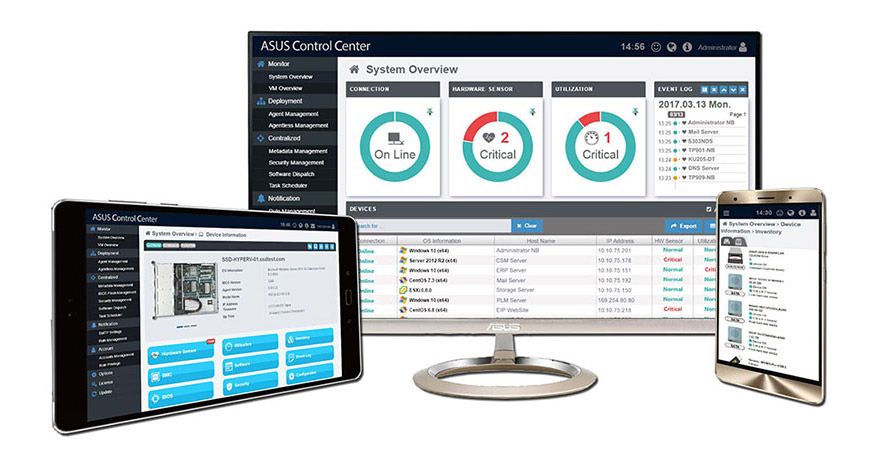World's
Leading-performance
x86 server processors
The latest AMD EPYC™ 7003 series processors are the new standard for modern data centers. AMD was first with X86 multi-chip-module server CPUs and continues to innovate with the 3rd Gen EPYC processors, including up to 32MB of L3 cache per core and synchronized fabric and memory-clock speeds designed for improved performance.

World's
Leading-performance
x86 server processors
Up to
32MB
of L3 cache per core to increase data analytic speeds
Up to
25%
generational performance gains in mid-tier CPUs
PCI Express® (PCIe®) 4.0 delivers 16 GT/s bandwidth, which is double the speed of PCIe 3.0, offering lower power consumption, better lane scalability and backwards compatibility. ASUS RS720A-E11 servers are PCIe 4.0 ready to support a diverse array of graphics, storage and networking – enabling flexible scalability for demanding or increasing workloads.
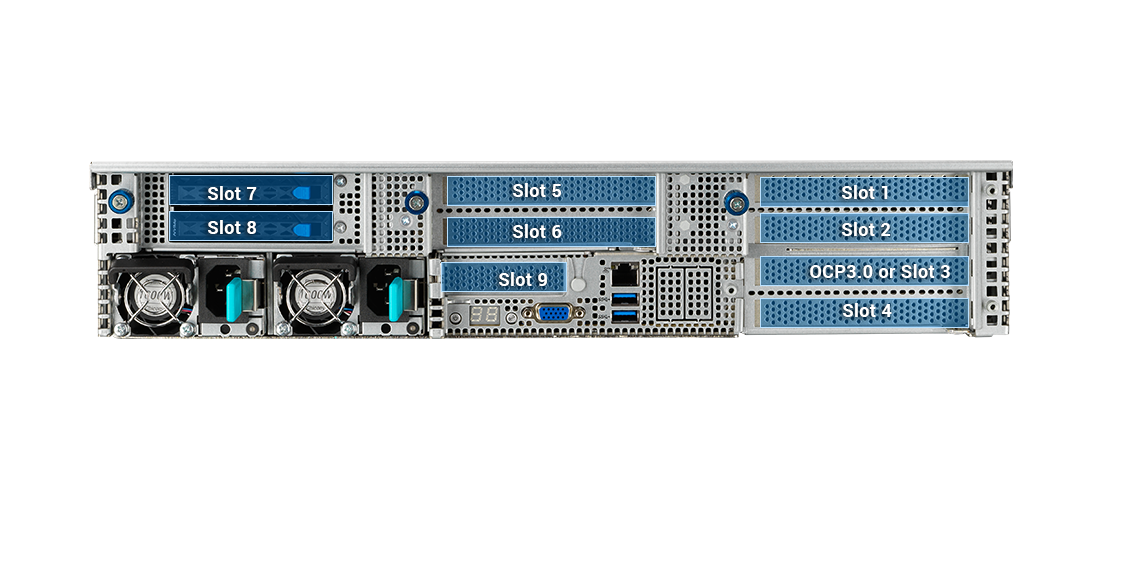


11 x PCIe x16 slot, FHFL (Gen4 x8 or x16 link)
21 x PCIe x16 slot, FHFL (Gen4 x8 or x0 link)
31 x PCIe x16 slot, FHFL (Gen4 x8 or x16 link)
41 x PCIe x16 slot, FHFL (Gen4 x8 or x0 link)
51 x PCIe x16 slot, FHFL (Gen4 x8 or x16 link)
61 x PCIe x16 slot, FHFL (Gen4 x8 or x0 link)
71 x 2.5” NVMe or 1 x PCIe x16 slot, FHFL (Gen4 x8 or x16 link)
81 x 2.5” NVMe or 1 x PCIe x16 slot, FHFL (Gen4 x8 or x0 link)
91 x PCIe Gen4 x8 or x16, LPHL
ASUS RS720A-E11 servers feature a powerful GPU architecture that supports up to four dual-slot GPUs such as NVIDIA A100 in one 2U system to enable easy scale-up in order to meet the demands of AI and high-performance computing (HPC), and to securely run workloads in virtualized environments.
ASUS AMD EPYC 7003-based series are Xilinx Alveo-qualified servers to provide optimized acceleration for workloads across cloud and on-premises data centers, and for hybrid cloud environments in financial computing, machine learning, computational storage, and data search and analytics.
* FPGA Xilinx verification is available on request.
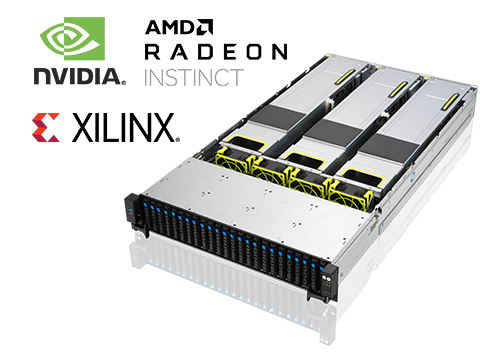
The new AMD EPYC 7003 processors excel at providing full features and functionality for both dual-socket and single-socket platforms, but our new servers ASUS is introducing an CPU-balanced architecture to enable secure and optimal CPU-performance efficiency.
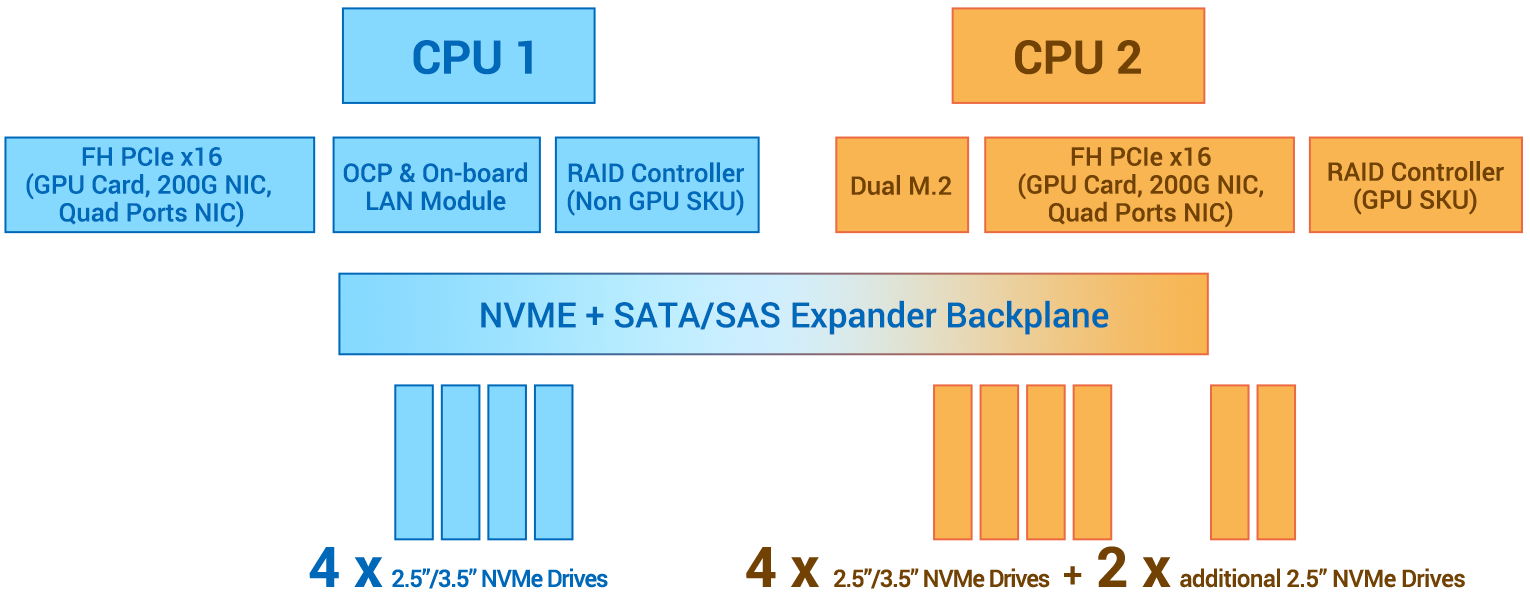
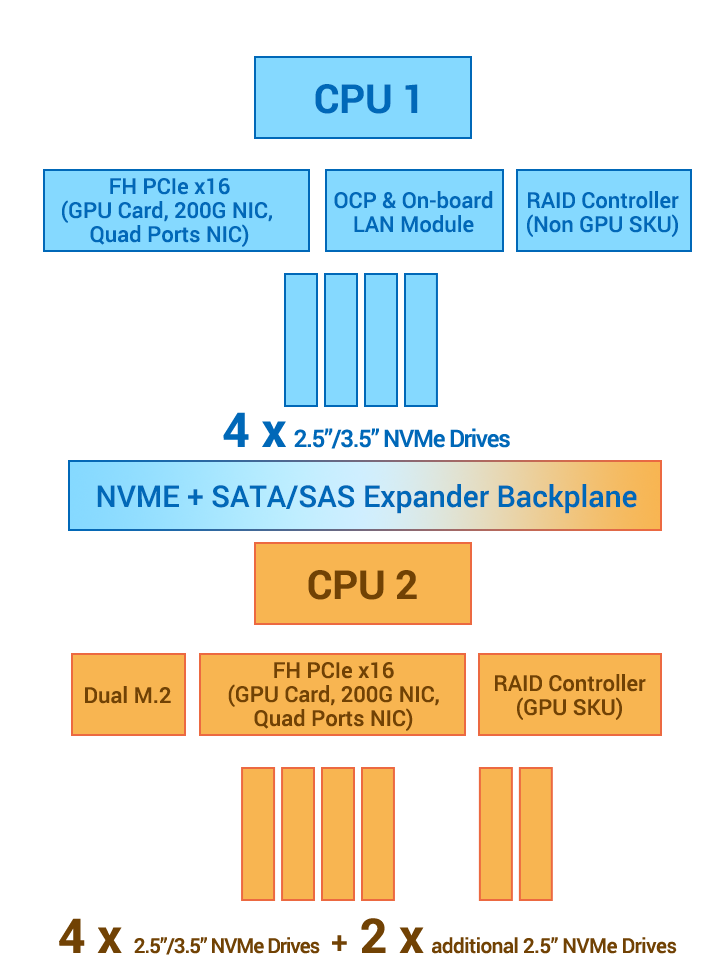
This architecture extends the full bandwidth to either dual- or single-CPU configurations, enabling more computing capability and much-improved overall power efficiency for compute-intensive workloads. This architecture allows customers to take full advantage of bandwidth capabilities of the dual-CPU architecture with a single CPU, while offering the flexibility to upgrade later with the addition of a second CPU.
* Features, specification and design vary by models and configuration.
ASUS RS720A-E11 servers offer a flexible, modular design to enable easy scale-up of configurations to meet increasing data-center workloads.
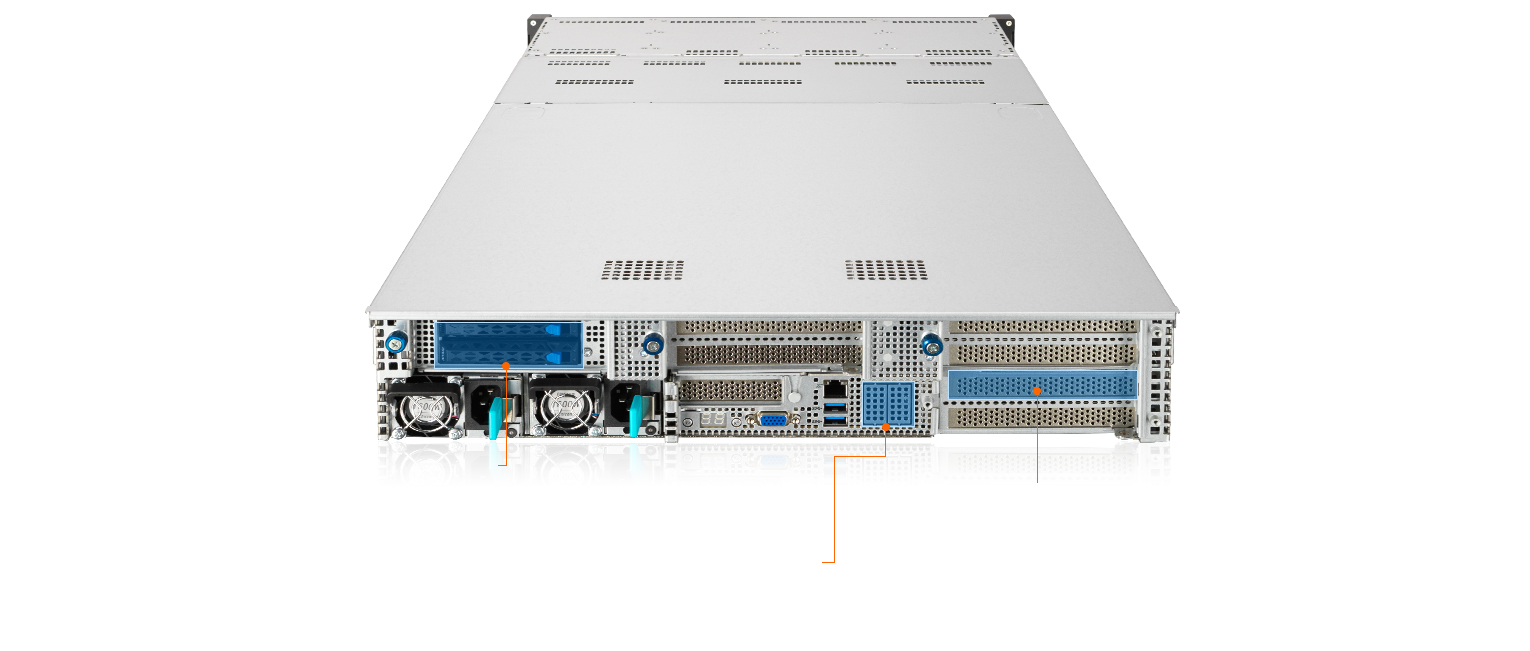
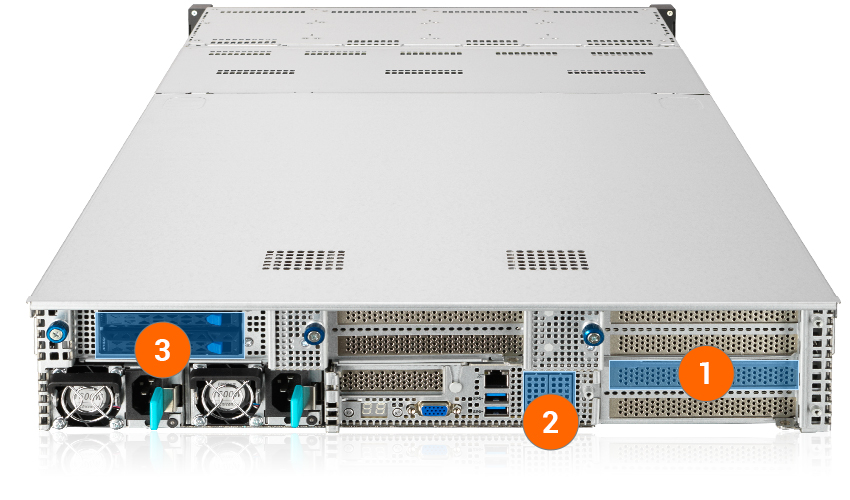
1One PCIe slot in rear panel is replaceable with an OCP 3.0 module for extended network bandwidth.
2The onboard LAN module design allows the default rear-panel LAN port to be replaced with either up to four 1 Gb or two 10 Gb LAN ports, enabling large-scale networking bandwidth for enterprise or data centers.
3Two PCIe slots in rear panel are replaceable with 2.5" NVMe HDD module for extended storage demand.
The system-switchable design enables PCI Express® (PCIe®) lanes to be direction to M.2, PCIe 4.0 slots or NVMe drives as required, maximizing performance and capabilities.

ASUS RS720A-E11 servers feature scalable storage solutions to support maximum performance for data center flexibility, and enable industry-standard SAS/SATA/NVMe interfacing through Broadcom Tri-Mode RAID adapters for increased connectivity and security. Up to 24 all-flash NVMe drives on front panel enable extensive storage and high-throughput performance.
RS720A-E11 servers offer four combinations of storage drive bays for different workloads:

24 NVMe: 16 NVMe +
8 NVMe/SATA/SAS*
12 NVMe: 12 NVMe +
8 SATA/SAS*

8 NVMe/SATA*/SAS* +
16 SATA*/SAS*

4 NVMe + 4 NVMe/SATA/SAS*+
4 SATA/SAS*

8 NVMe/SATA*/SAS* +
4 SATA*/SAS*
* This configuration is required to be with PIKE/RAID cards.
Data centers typically demand high-performance processors, GPUs or memory in dense configurations to run HPC or AI workloads. ASUS RS720A-E11 servers feature either air or liquid-cooled solutions, with Asetek’s Direct-to-Chip (D2C) liquid-cooling technology achieving lower power-usage effectiveness (PUE) and optimized TCO for data centers.
Drop-in replacements for air heat sinks that transfer heat out of the server with liquid.
Rack level D2C solution for liquid-cooled data centers.
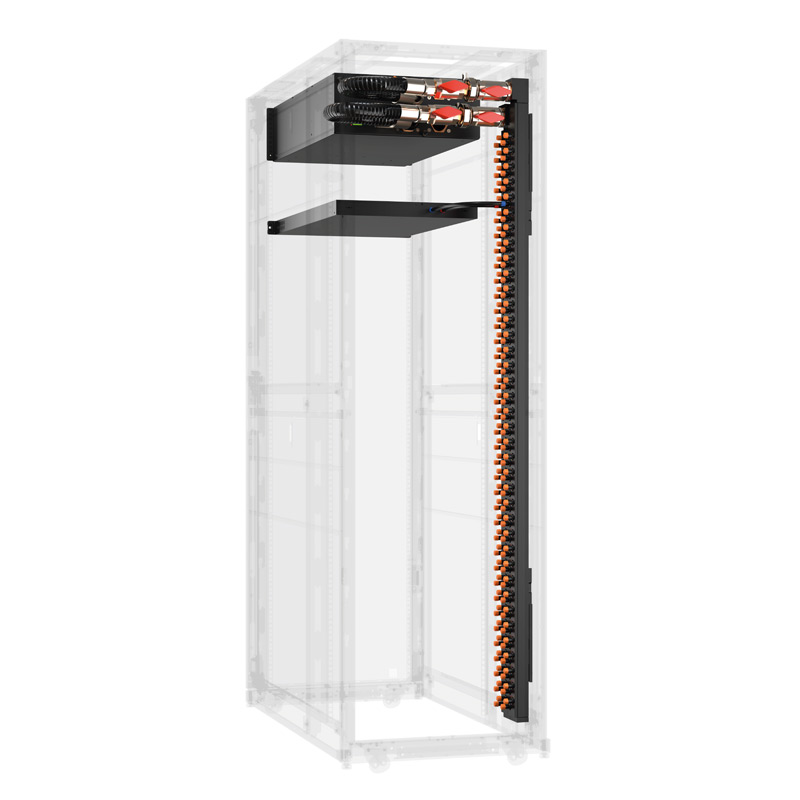
ASUS RS720A-E11 servers integrate PFR FPGA as the platform Root-of-Trust solution for firmware resiliency to prevent from hackers from gaining access to infrastructure. ASUS security solutions are fully compliant with the 2018 National Institute of Standards and Technology (NIST) SP 800 193 specification.
In addition, all RS720A-E11 servers also include support Trusted Platform Module 2.0 (TPM 2.0) to secure hardware through integrated cryptographic keys and offer regular firmware update for vulnerabilities.
* Both PFR and TPM are options, available on request.

ASUS RS720A-E11 servers feature the latest OCP NIC 3.0 card with PCIe 4.0 bandwidth for a faster time-to-market network solution, delivering the speeds of up to 200 Gbps for high bandwidth and low latency. It also features a tool-less, hot-swappable design to simplify installation and serviceability.

ASUS ASMB10-iKVM is the latest server-management solution from ASUS, built upon the ASPEED 2600 chipset running on the latest AMI MegaRAC SP-X. The module provides various interfaces to enable out-of-band server management through WebGUI, Intelligent Platform Management Interface (IPMI) and Redfish® API.
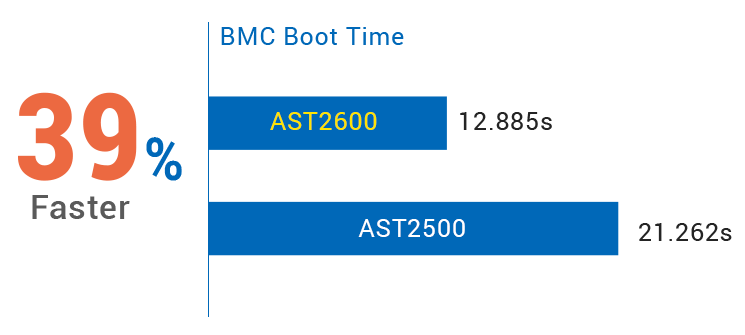
ASUS Control Center (ACC) is a centralized and integrated IT-management platform for monitoring and controlling ASUS servers, workstations and mini PCs. ACC enables remote BIOS updates, monitoring of multiple systems via mobile devices, and one-click software updates and dispatching, allowing easier server management for any IT infrastructure.
